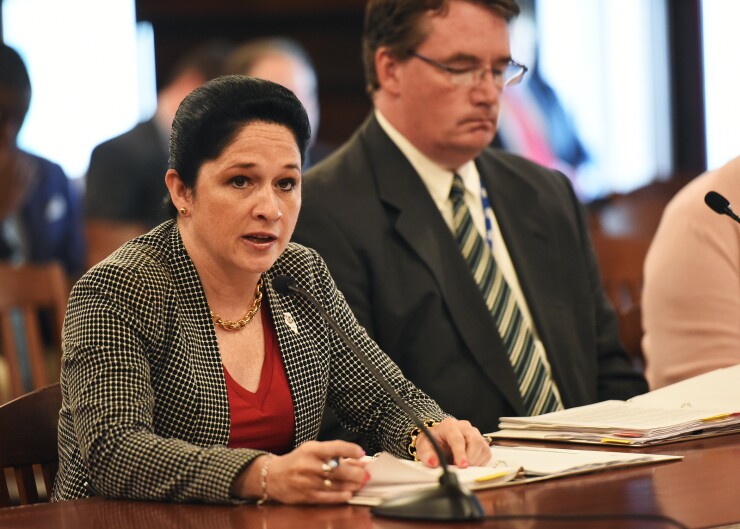CHICAGO – Illinois racked up $1.03 billion in interest on its bill backlog thanks to the two-year budget impasse that drove the list of overdue bills up to a peak of $16 billion.
State agencies are also holding $2.3 billion of bills that can’t be paid until the General Assembly approves appropriations for them.

Those are among key findings in state Comptroller Susana Mendoza’s
The new law, enacted by lawmakers who overrode Gov. Bruce Rauner’s veto of the legislation last fall, requires state agencies to report monthly on bills they are holding, penalties, and appropriations. Previously, they were required only to submit an annual report.
The $1 billion interest cost confirms prior estimates and covers the period from when the state opened the books on fiscal 2016 on July 1, 2015 without a budget through Dec. 31, 2017, said comptroller spokesman Abdon Pallasch.
After just over two years without a budget, lawmakers on July 6 enacted a fiscal 2018 budget, with $5 billion in tax hikes, by overriding a Rauner veto.
“Now we can all see a clearer picture of what Illinois owes to small businesses, universities, community colleges, social service providers and others. The Debt Transparency Report takes the politics out of the numbers to provide meaningful data,” Mendoza said in a statement announcing details of the first report.
The state’s backlog had previously hit a high of nearly $10 billion in 2010 before higher income tax revenues began to flow in from a temporary rate hike passed in 2011. By the time Rauner took office in 2015, it was down to about $5 billion.
The backlog ratcheted up during the gridlock and hovered around $15 billion to $16 billion until the state sold $6 billion of general obligation bonds last fall. The debt was approved to pay down bills in the budget package. The bond deals sold at a premium providing an infusion of $6.48 billion of proceeds. The state leveraged another $2.2 billion in federal matching healthcare dollars. Higher income tax revenue has also begun to flow into state coffers.
The backlog stood at $9.2 billion on Dec. 31, including $2.5 billion of state agency bills. It currently stands at $8.8 billion. The state pays interest rates of 9% to 12% on some of its bills depending on their type and their due date.
While Rauner inherited at least a $5 billion backlog, Mendoza laid the blame for the buildup to $16 billion at his doorstep for “failing to budget for the state’s true liabilities during his tenure.” The GOP has countered that the impasse could have been averted if Democrats were more willing to compromise on Rauner’s initiatives which Democrats had labeled as anti-union and anti-middle class.
All but four of the 84 state agencies and universities required to report responded for the reporting period ending Dec. 31. The Department of Central Management Services had the largest accrued late payment liabilities at $434 million followed by the Department of Healthcare and Family Services with $236 million.
Of the $2.3 billion in unappropriated liabilities held at state agencies, the Department of Corrections accounts for $420 million followed by the Department of Human Services with $118 million.
“Until appropriations for these liabilities are approved by the legislature and become law, these bills cannot be submitted to the Comptroller’s office for payment. They will remain at the agencies, and many of them will continue to accrue late payment interest penalties,” the report read.
Passage of the budget package allowed the state avert a bond-rating cut to junk, but the state’s ratings still are at risk as the deep political divide between the GOP governor and General Assembly’s Democratic majority remains with statewide elections looming in November. The state is rated at the lowest investment grade level by Moody’s Investors Service and S&P Global Ratings and two notches into investment grade territory by Fitch Ratings.
Rauner will deliver his State of the State address next week and unveil a fiscal 2019 budget next month. “
As part of his budget address, he needs to present taxpayers with a detailed proposal for paying off the operating debt and interest penalties his administration ran up,” Mendoza said in the statement.





